
-
 86-21-63895588
86-21-63895588
-
 No.1, Lane 600, Nanchezhan Road, Huangpu District, Shanghai 200011
No.1, Lane 600, Nanchezhan Road, Huangpu District, Shanghai 200011
Release time:2021-10-18

On October 5th, 2021, over 50 students from Fanhai International School of Finance (FISF), Fudan University’s Elite Master of Finance Program and Berlin School of Economics and Law (Hochschule für Wirtschaft und Recht Berlin - HWR Berlin) were participating online and offline to inaugurate the first Shanghai Berlin Business Students Dialogue. The dialogue focused on Sustainability in Global Finance and was a part of the 2021 Asia Berlin Summit organized by the Berlin Senate Department for Economics, Energy and Public Enterprises.
The dialogue session was cosponsored by FISF and HWR with the affiliated Berlin Institute of Finance Innovation and Digitization (BIFID).
The program started with an official welcome on behalf of this year’s Asia Berlin Summit organizing committee by Dr. Martin Uzik, Professor of Operational Financing and Investment Policy at BIFID. Prof. Uzik highlighted the importance for young people to develop viable solutions to use the financial industry as tool to develop our planet sustainably, e.g. by use of FinTech.
FISF adjunct instructor and mentor Mr. Allan Chou, the founder of RAIDiCal, a Global tech fund of funds advisory, gave reciprocal remarks as an Honorary Ambassador to the Asia Berlin Summit. He thanked Dr. Uzik and HWR Berlin for co-sponsoring the event and congratulated all participants on the start of long-term cooperation between the two schools and cities.
Mr. Chou then introduced Professor Dr. Christoph Nedopil Wang, Associate Professor at FISF and Director of the Green Finance & Development Center. To kick-off the interactive discussion between the students.
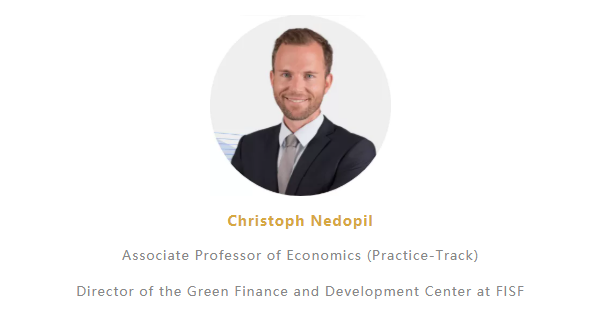
Dr. Nedopil shared some initial thoughts on the issue of climate change and green finance. As green finance needs to find solutions to tackle the climate and biodiversity crisis, he highlighted three surprising climate facts:
◆The carbon feedback loops, where global temperature rise leads to thawing of permafrost which releases more greenhouse gas emissions and accelerates global warming, are an important but little understood risk factor for the global economies.
He then shared thoughts on how green finance can work to include more climate and environmental risks in decision-making, while providing finance to protect nature.
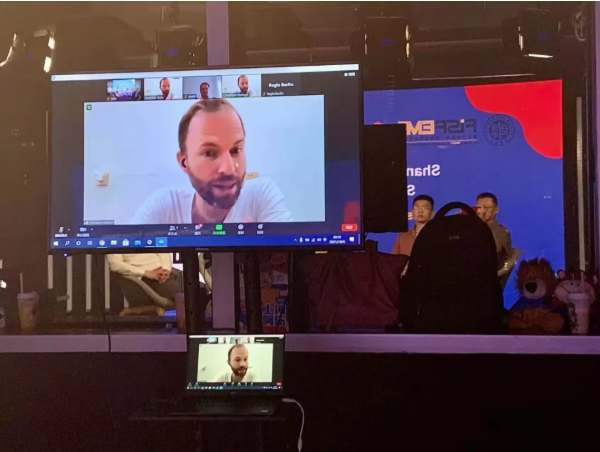
The interactive discussion was also led by Dr. Nedopil, who asked the students about their thoughts on important dilemmas on green finance, such as whether climate change is an opportunity or a risk for the economy, or whether dealing with climate change requires more regulation or should be solved through market forces.
The students from Berlin and Shanghai shared their thoughts candidly and discussed vividly sharing personal experiences from less developed villages in China and from professional challenges. EMF student representatives who attended the crosscross-boarder discussions on campus.
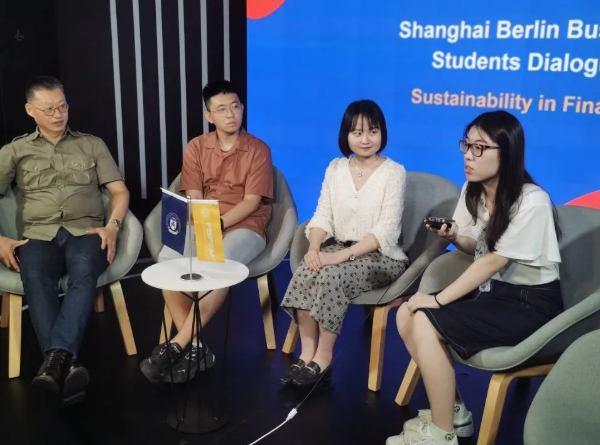
He then shared thoughts on how green finance can work to include more climate and environmental risks in decision-making, while providing finance to protect nature.
He then shared thoughts on how green finance can work to include more climate and environmental risks in decision-making, while providing finance to protect nature.
The hour and a half dialogue ended with Mr. Justin Hou, the head of EMF program, sharing that there are a wide range of opportunities at FISF EMF program to help the students to gain global vision, including students’ dialogues, overseas module, international challenges, dual degree programs, etc. He encouraged to continue the dialogue between the two programs to work on relevant challenges in Sustainability in Finance, and would like to work together to pitch relevant innovations for sustainable finance at the 2022 Asia Berlin Summit.
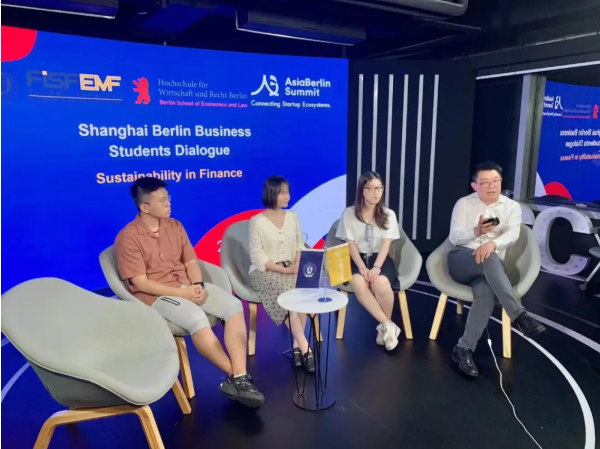
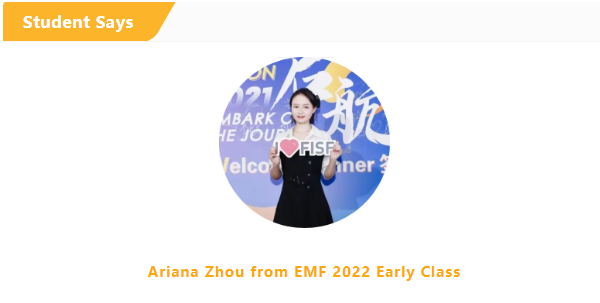
“It was my honor to participate in this hybrid offline and online dialogue session. Under the guidance of Professor Christoph, we discussed heated topics like carbon trading system, ESG and so on. I was impressed by the vast variety of areas, ranging from living a green life, improving regulation and trading systems to developing clean energy and carbon capture technology as well, that we can take an active part and contribute our effort to make this world a better place.”
About Organizations
AsiaBerlin, powered by the Berlin Senate Department, forms the collective platform that brings together communities within the startup ecosystems across Asia and Berlin. We enable relationship-building among investors, startups, and bridge builders by organizing monthly AsiaBerlin events and delegation trips to Berlin and Asia throughout the year. Our flagship event, the AsiaBerlin Summit is the annual summit of year-long AsiaBerlin activities where policymakers, startups, and investors meet to discuss the newest tech trends and cross-border collaboration between Asia and Berlin. We work closely with our partners in the Asia-Pacific Forum Berlin (APFB) and enpact, along with the ever-growing support of our honorary Ambassadors.